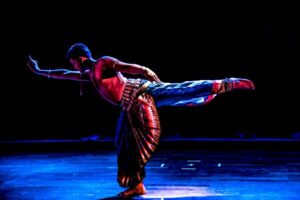Dancers are known to follow their passion aggressively. Sometimes the fire burns so bright that one keeps moving from one city to the other like a gypsy just to keep the fire of their art burning. But today, I wish to make you all meet a dancer who moved from his birth land Trindad and Tobago only to pursue his passion for Indian culture, especially Odissi dance. Vinod Kevin Bachan is one bundle of talent who left everything behind only to fall in love with India and its rich heritage.
Bachan has performed Odissi in countries such as, Grenada, Barbados, United Kingdom, Malaysia, Brazil and more plus has received various awards such as Natya Mayaurm, Tarana Yuva Puruskar, Kala Shriumoni Award and Bharata Shastra Nritya Praveena, Nritya Shirmonai Samman and many others. He has received scholarship under the Ministry of External Affairs- Indian Council for Cultural Relations. He is also an empanelled artist of ICCR and All India Dancers Association. Here are some excerpts from my chat with him:
Being from another country how difficult was it to break into the India classical dance scene?
Initially, it was very tough for me as I entered Odissi dance very late. I started professionally at 22 and that that age most dancers have already made a mark in the industry and a major setback for me also was I started learning Odissi late, before that I was doing my training in Kuchipudi.
I looked back at all the sacrifices my parents were making for me to live my dream and that propelled me to work hard and helped me achieve my goals. I was searching for a Guru and my search ended in 2014 when I met Guru Ranjana Gauhar. She gave me that extra push I needed. She took on the role of being both my parent, mentor and a guide and encouraged me and challenged me to work even harder to break barriers. On the other hand, my being from another country is fascinating for many and someone of Indian origin from oversees coming to India to take up classical dance as a career made my journey a tad easy.

How difficult is it to be a male dancer in a female-dominated industry?
It is very challenging and the view point that Odissi is a female-oriented dance has very little change in the minds of many. Having said that, the founding fathers were all male and not just Gurus but performers too, but they all seemed to have been forgotten. We have many male Odissi dancers, but people still it’s a female-oriented style. Most festivals invite female dancers. There are very few platforms which are dedicated exclusively to male dancers.
This mind set needs to change not just within the industry but also in society at large. Young boys are discouraged from pursing classical dance by parents, who insist that boys should take up masculine jobs. But I am of the firm belief that we are all are a mix of both energies male and female -yin and yang, and we should never stop boys from pursing dance if it is something they love. Dance knows no gender.
Apart from dance what all have you learnt under your guru Ranjana Gauhar?
Determination and strength, I have also learnt organisational skills through her festivals. She is also involved in making films, documentaries, choreographies, script writing, even writing various articles for publications; she keeps me involved in all her endeavours. The major thing she taught me is self-worth and confidence. She has made me understand the importance of surrendering to my art and to the divine energy.
Which has been your most memorable performance, and why?
There are two: the first being Konark Festival. When I left Odisha and came to Delhi most people around me said I’ll never make it as a dancer, as Odissi should be learnt only in Odisha. But after performing at Konark in my Guruji’s production in 2018 Matsaya Avaatar where I was the lead, we received critical acclaim. The love and respect I received and continue to receive from the people there was amazing. Even those who said I’ll never make it appreciated me.
Second was Khajuraho in 2021, I remember being nervous but at the same time happy. I walked on stage as soon as I heard the sound of mardal and I suddenly got the feeling of bliss, joy – the love for art came rushing in. I felt connected to the source and at that point I knew this is where I belong and I felt now I have Reached!
Any plans to popularise Odissi to your country?
In Trinidad and Tobago, Odissi is already well-known due to huge Indian diaspora. Unfortunately, dance is not seen as anything lucrative but just as a hobby for little girls. After trying for several years to break the mental concept of dance and after a lot of soul searching I realised that my calling is being a stage performer in my new home, India.
When I go to Trinidad and Tobago, I do workshops and performances, etc. but, there is nothing more I can do there. India, especially Delhi is my home now. The thrill of travelling, performing, sharing my art within India and abroad to receptive audiences, I will never get these experiences from my birth country. Hence India is home for me. I miss my parents but they are supportive of my decision to settle in India as they have seen my struggle with trying to make a change in Trinidad and Tobago.